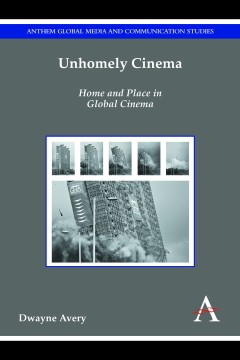Unhomely Cinema
Home and Place in Global Cinema
By Dwayne Avery
Other Formats Available:
- About This Book
- Reviews
- Author Information
- Series
- Table of Contents
- Links
- Podcasts
About This Book
“Unhomely Cinema” explores how the unhomely nature of contemporary film narrative provides an insight into what it means to dwell in today’s global societies. Drawing from Freud’s concept of the uncanny – that frightful and inexplicable experience of the home as foreign and strange – the unhomely speaks to the spatial dislocation, transience, homelessness and disempowerment symptomatic of contemporary global societies.
While uncanny homes are traditionally associated with the science fiction and horror genres, “Unhomely Cinema” shows how an array of film genres – from Michel Gondry’s comedy “Be Kind Rewind” to Laurent Cantet’s eerie suspense thriller “Time Out” – use the figure of the precarious home to engage with some of the most pertinent social and cultural issues involved in the question of “making home.”
Encounters with the unhomely often result in the painful loss of home, but the unhomely can also offer an ethics of dwelling, whereby the impossibility of narrative closure represents new and more hopeful ways of dwelling in the world.
Reviews
“This thoughtful, engaging book highlights the enduring preoccupation with concepts of home in modern cinema. ‘Unhomely Cinema’ is a delightful work which moves film studies towards productive engagements with psychoanalysis, urban geography and social history.” —Will Straw, Director, McGill Institute for the Study of Canada, Montreal
“‘Unhomely Cinema’ delivers a powerful reading of today’s global cinema of precarity. Avery’s concept of the ‘cinematic unhomely’ provides a bold new model for understanding how contemporary film registers and reacts to the displacements and dislocations that define everyday life in the modern world.” —Andrew Burke, University of Winnipeg
“As attentive to problems of mobility, scale and time as it is to place, ‘Unhomely Cinema’ inhabits the house of contemporary narrative cinema with great care. Through Avery’s sharp eyes, we glimpse new ways of dwelling in the most uncanny of places.” —Edward Schantz, McGill University, Montreal
“This thoughtful, engaging book highlights the enduring preoccupation with concepts of home in modern cinema. ‘Unhomely Cinema’ is a delightful work which moves film studies towards productive engagements with psychoanalysis, urban geography and social history.” —Will Straw, Director, McGill Institute for the Study of Canada, Montreal
“‘Unhomely Cinema’ delivers a powerful reading of today’s global cinema of precarity. Avery’s concept of the ‘cinematic unhomely’ provides a bold new model for understanding how contemporary film registers and reacts to the displacements and dislocations that define everyday life in the modern world.” —Andrew Burke, University of Winnipeg
“As attentive to problems of mobility, scale and time as it is to place, ‘Unhomely Cinema’ inhabits the house of contemporary narrative cinema with great care. Through Avery’s sharp eyes, we glimpse new ways of dwelling in the most uncanny of places.” —Edward Schantz, McGill University, Montreal
Author Information
Dwayne Avery is a postdoctoral fellow at York University, Toronto. He received his PhD from McGill University, Montreal.
Series
Anthem Global Media and Communication Studies
Anthem Film and Culture
Table of Contents
Introduction: Unhomely Cinema; 1. An Unhomely Theory; 2. The Decline of the Family: Home and Nation in Krzysztof Kieślowski’s “The Decalogue”; 3. The Future Is behind You: Global Gentrification and the Unhomely Nature of Discarded Places; 4. No Place to Call Home: Work and Home in Paul Thomas Anderson’s “Punch Drunk Love” and Jason Reitman’s “Up in the Air”; 5. The Terrible Lightness of Being Mobile: “Cell Phone” and the Dislocation of Home; 6. Unhomely Revolt in Laurent Cantet’s “Time Out”; Conclusion; References; Index
Links
Stay Updated
Information
Latest Tweets



